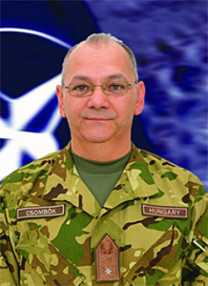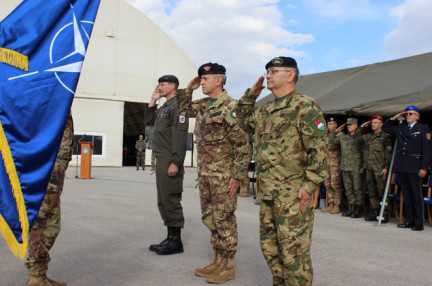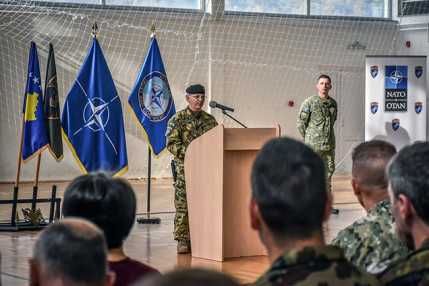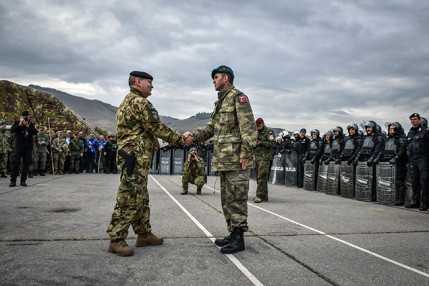“Security Is Unfortunately Still Fragile”
Szöveg: László Szűcs | 2017. november 29. 9:00Since 6 October, Brig.-Gen. János Csombók has been the Deputy Commander of the KFOR mission (DCOM KFOR). He is the second Hungarian general to assume this highly important position in the NATO-led peacekeeping operation. We had a conversation with him.

It was Chief of Defence General Dr. Tibor Benkő who requested me to fill this position. The Deputy Commander of KFOR is practically the highest military position Hungary can fill in a NATO operation, and it has now been given to Hungary for the second time. For this reason, it is a professional recognition and a great honor to me that I have been chosen to fill this position as the second Hungarian general after Maj.-Gen. Ferenc Korom.
What does the DCOM KFOR position mean in your military career?
I consider this position as one of the apexes in my professional career as commander and operations officer. It gives me great pleasure to see that the word “commander" is in the designation of my position again, because until my transfer to this post, I had served as Chief of the General Staff Force Planning Directorate. I think every commander’s dream is a position in which they are responsible for directing the operations, training and exercises of more than 4000 troops from 28 nations and coordinate their activities in the interest of attaining operational objectives in a NATO-led armed operation.
In my opinion, the experience I gained during my over 30-year-long career in different Hungarian and foreign positions – mostly as commander and operations officer – and the knowledge I acquired at the Hungarian and international professional and leadership training courses form an adequate basis for the successful execution of my tasks in this position. Of course, a high level of proficiency in English is also essential, and I am fortunate not to have any problems with that, as I speak English and German fluently.

With how many missions and in which countries have you served so far?
Except for Iraq, I had opportunity to visit every area of operations for a short survey of the theatre. This is my second tour with KFOR, last time I served with KFOR as deputy chief operations and training in the Western Kosovo region back in 2008–2009. Now, I will serve as DCOM KFOR for a year, during which – together with close to 400 Hungarian comrades of mine – I will be able to promote the security of the region and Hungary.
What duties does the DCOM KFOR have?
As the designation of my position indicates, my most important duties are to replace the commander, and to make decisions in his absence – when he is away on a service trip or on paid or sick leave – about the entire KFOR operation. The COMKFOR has specified my professional area of responsibility in an official letter, and has given me complete discretion to deal with that. I am assigned the responsibility of cooperating with the United Nations Mission in Kosovo (UNMIK), the Organization for Security and Co-operation in Europe (OSCE), the European Union, the European Union Rule of Law Mission in Kosovo (EULEX) and the Council of Europe. My other important duties include maintaining contact with the Kosovo Police and the military leaders of the Kosovo Security Force (KSF).
My favorite task of all is that of coordinating the training and exercises of KFOR subunits. Because we are working in an area of operations, these exercises not only have training-related but also operational significance, as we can thereby contribute to the maintenance of necessary military presence and an adequate level of deterrence, while concurrently supporting the capability-building and enhancement process of the local security forces. The latter is also included in KFOR’s mission.
Another important duty of mine is to support Camp Novo Selo, which has outstanding significance to Hungary since most of our troops are stationed in this camp, and the camp commander is a Hungarian senior officer.
I am supported in my job by a staff of four soldiers led by Col. János Pölöskei. My day-to-day security is provided by a close protection team which was established and well prepared by the HDF Military Police Center.

What are the challenges of this one-year job?
In close cooperation with the Kosovo Police and the EULEX capabilities, KFOR as the third responder contributes to maintaining a safe and secure environment and freedom of movement in Kosovo. An exception is the 24/7 guarding of Decan monastery, which is still a KFOR-only task. Security is unfortunately still fragile, as attested by the fact that even a conflict among teenagers may escalate into a countrywide riot in a short time. A significant security challenge was the first round of the municipal elections held on 22 October, and its second round on 19 November. Among next year’s greatest security challenges I would mention the creation of the Specialist Chambers, which is due to begin next spring and the effect on security of the Dialogue between Belgrade and Pristina.
Speaking of that, the security architecture in Kosovo is very complex and difficult to predict, therefore it is important to maintain a high level of situational awareness, to recognize the necessary indicators and to sustain readiness at a high level.
The Hungarian Defence Forces are making a substantial contribution to the KFOR mission with a contingent and soldiers serving in several individual positions. What is the opinion about Hungarian soldiers in this NATO-led peacekeeping operation?
I would like to highlight the stabilizing role of KFOR in the entire Balkans, in which the Hungarian KFOR Tactical Reserve Battalion (KTRBN) plays a significant role through its conducting joint training activities with the military capability of the EUFOR Althea, a military deployment in Bosnia-Herzegovina; and under the Berlin Plus agreement, the KTRBN can be deployed any time in that country too. Besides the KTRBN, the Hungarian Liaison and Monitoring Team (LMT) also conducts a very important activity in Podujevo municipality; it is often said at the HQ that its members are KFOR’s eyes and ears. Furthermore, Hungary delegates a significant number of officers and NCOs in individual positions to the staff of the KFOR HQ in Camp Film City, Pristina. All in all, we can say that Hungary is one of the most significant troop contributing nations. That is why we have been assigned the second highest position (DCOM) in the KFOR operation.
The prestige of Hungarian troops is very high, which can of course be credited to the fact that all Hungarian soldiers are conscientiously doing their job in their posts. The best indicator of the level of esteem accorded to them is that at the commanders’ briefings, COMKFOR Maj.-Gen. Giovanni Fungo regularly holds up as an example the performance of the Hungarian KTRBN in the execution of operational tasks and the planning and conduct of exercises. (On 15 November, a change of command took place in KFOR, and the new 22nd commander of the peacekeeping mission is Italian Maj.-Gen. Salvatore Cuoci – the editor). Another sign of esteem is that in less than two months of joint service, COMKFOR recognized in writing the job done by the Hungarian DCOM KFOR and thereby the job done by all Hungarian service members.

Does the fact that a Hungarian general serves as DCOM KFOR bring any “advantages" to Hungarian soldiers?
Yes, of course, as in my capacity as DCOM KFOR, I can and actually do things to improve the living circumstances and the conditions of task execution for our troops. I can make proposals that directly influence the decisions taken by COMKFOR. And I give first-hand answers to all questions the commander of the Hungarian KTRBN asks me about the commander’s intent and the concept of operations during the planning and conduct of operations. This entails a greater responsibility too, for more attention is drawn to every Hungarian soldier as they carry out their tasks. In my capacity as DCOM KFOR, fortunately I can do things to better the provisioning and services for our soldiers and to enable them to spend their free time more pleasantly, because I am the head of the committee that makes decisions about that.
Outside office hours, do you have opportunity to meet the Hungarian soldiers? What are the possibilities for spending your free time in the first place?
I regularly met them at our collective events, where we do our best to popularize Hungary as well. During our meals, I take the opportunity and have lunches and dinners together with my soldiers instead of sitting at the commanders’ table.
What should one know about the peacekeeping mission in Kosovo at present? Are any major changes expected in the future?
KFOR is currently made up of some 4000 troops from 20 NATO member nations and eight partner nations. KFOR is the most widely recognized organization in the area of operations, and with its existing capabilities – in close cooperation with the Kosovo Police and the EULEX police forces – it is able to guarantee security in the country. NATO’s North Atlantic Council paid a visit to the KFOR HQ on 27 October, which is of course indicative of the importance of the operation. The representatives of international organizations in Kosovo consider it highly important that KFOR can maintain its present capability level. In NATO, the member nations can make a decision on this, after thorough analysis and planning. In my opinion, the amount of military capabilities will not change significantly in the near future.

What is the current security situation in Kosovo?
I hold it important to emphasize that there are some political and strategic goals related to this operation that cannot be attained with military capabilities. These include the issue of border demarcation with Montenegro, that of an “administrative boundary line" with Serbia, but I can also mention the transformation of the Kosovo Security Force (KSF) into Kosovo Armed Forces (KAF). The current security situation is stable but very fragile. The presence of KFOR is indispensable for maintaining security. I would like to highlight the word “fragile". As I have already noted, even an insignificant-looking event can trigger serious developments that undermine security, and the escalation potential is very high because there are a great many social wounds, some of which can heal only with the passing of time.